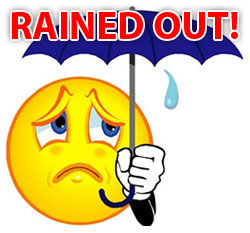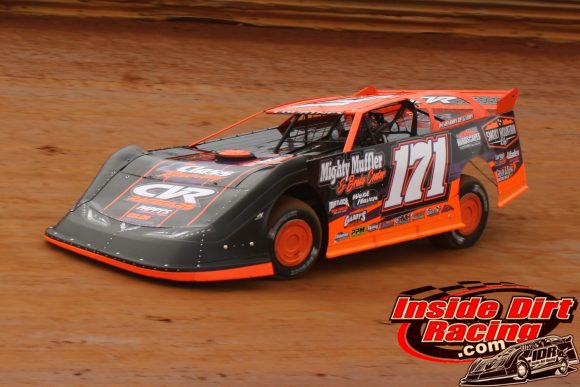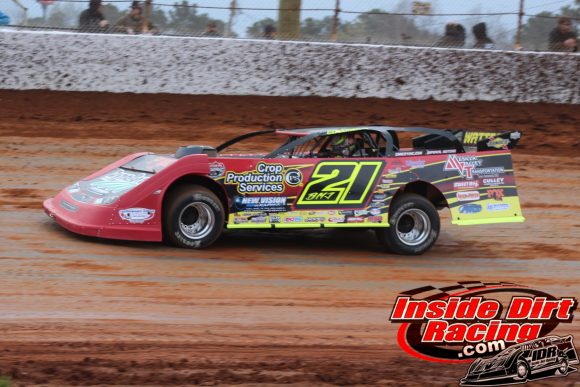*Turn 2 Blog is a regular feature on InsideDirtRacing.com. Here, site operators Michael Moats and Richard Allen take turns offering their thoughts on the dirt racing topics of the day from east Tennessee and beyond.
Richard: It was announced last Thursday by Speedway Motorsports, Inc. that the company which operates eight tracks that fall under NASCAR sanction has initiated a new policy regarding rain outs. According to the ‘Weather Guarantee’ should a race not run on its originally scheduled date, the ticket holder will be eligible to exchange that ticket for one at any of SMI’s tracks for a period of one year within the date of the missed event, including that particular race for the next year. Obviously, if the ticket holder simply goes to the race when it is actually run, the guarantee does not apply.
While dirt tracks do often have somewhat similar policies regarding rained out races, this one has a bit more exactness to it.
It seems to me that there have been more races I have intended to attend impacted by weather in 2018 than usual. And I most definitely understand the frustration from all sides when it comes to missing a race. Fans are disappointed, racers are disappointed, and perhaps most of all, promoters are disappointed. And part of that frustration comes from the uncertainty of what is going to eventually happen with the event in question.
Offering the same policy as SMI would essentially be impossible for dirt tracks because there can be such a difference in the types of racing that go on at a given facility. A national touring race comes at one ticket price while a regional series brings another and a weekly show still another. But what I do like about the policy is the certainty of it. I would like to see dirt tracks offer more of a definite backup plan for possible rain outs.
I believe it would help promoters greatly to come out and say this is what will happen if this race gets rained out. I believe fans would be more willing to drive to a track if they knew for certain what was going to occur should rain start to fall. My hope would be that taking a more definite stance would result in fewer cancellations simply based on forecasts rather than actual rain.
Michael: One thing that makes it easier for most dirt tracks is if the race is rained out before the gates even open, they don’t have to worry about refunds, make-up dates for tickets, etc. That’s one reason some races are called off in advance when the weather is questionable just to avoid the conflicts you mentioned. Obviously, tracks that do sell tickets in advance for a particular event fall into just what you are saying. In that case, pre-paid tickets would be honored when the race is rescheduled.
The big problem for dirt tracks is when a race is rained out after the program has started. If the parties can agree to a makeup date, tickets would be honored for that date. But if the race has to be cancelled, then it becomes a matter of allowing fans, drivers, crews, and others to use those tickets or armbands at another event. It can become a big problem.
I can understand the frustration of the fans when it comes to having to use one ticket for another race, especially if there is some travel involved for those fans. Some tracks do not do a good job of relaying the information to the fans. In other cases, fans who do not use social media feel left in the dark.
One unique example is the Southern Nationals race at Smoky Mountain Speedway a couple of weeks ago. It rained after qualifying and didn’t stop for close to 30 minutes. With the track being under curfew, there was no way to get the racing surface ready and then resume the show. Over an hour was spent trying to come up with a makeup date with four series involved. It was really hard to find something that worked for all parties so they wound up cancelling race. The fans that stuck around waiting on a decision were understandably frustrated with the lengthy delay in a decision. It was tough for everybody. There always seems to be a unique situation that comes up that makes it hard to prepare for.
Richard: That’s a good point you make regarding the fact that sometimes there are multiple series involved which makes finding makeup dates difficult. And when you have a facility such as Smoky Mountain that only has a limited number of races scheduled each year, rain outs hurt that much more. Keep in mind that tracks prefer to race because they lose money by just sitting idle. I think sometimes frustrated fans think the track is trying to pull something over on them by calling races off, but that is definitely not the case.
At the same time, however, I do believe all tracks could do a better job of communicating their postponement policies ahead of time. Further, I believe the series could help out by also establishing clear policies and making their potential makeup dates known to the tracks ahead of time to avoid the back-and-forth type situation that we recently saw. That would serve as a preemptive strike against a great deal of frustration.
But again, it’s far harder than people think which makes me appreciate those who are willing to take the risks of putting on races that much more. What are your thoughts?
Michael: There are so many series these days that I think it would be really hard for all of them to have potential makeup dates in mind. There could be an “open date” on the last weekend of a month. One series has a rain out and that date is selected. Another track 2 hours away may have the same date in mind for a makeup, then another series/track takes that date. It’s either lose the date or schedule on top of each other. Neither is good.
One thing fans need to keep in mind is this- If they give their money to a track for a race, they are not getting it back unless there are some unusual circumstances. As you eluded to the new SMI policy, it’s pretty much the same thing. And it’s no different than a baseball game where a game might get rained out, they will let the fans use the ticket for another game. It’s very rare for an entertainment venue to offer refunds on rained out events. If fans will remember this, it should lead to a lot less frustration on their part.
Richard: To move on to another topic, one thing I have been made more aware of recently is the concern by drivers and teams regarding pay throughout the field. In an interview we posted with UCRA racer Kyle Courtney, he pointed out the move by that series earlier this season to take $500 previously designated for the winner and distributing it along with more money back through the field. In other words, the standard winner payout for most of their races went from $2,500 to $2,000. But at the same time, the pay throughout the field went up by a total of $1,000.
This means a great deal to racers because as Courtney pointed out, a driver can’t win every time.
Another situation in which I have seen this came after the new management of Boyd’s Speedway posted the payout for their weekly races. The reaction on social media was a spirited one.
Fans are often attracted to an event by the pay to winner but racers are typically more concerned about pay through the field. Billy Moyer, Jr., in a story we posted, basically said that if the pay is not good through the field, he probably won’t go.
This really is a big deal, isn’t it?
Michael: As expensive as racing is these days, it is a big deal. If drivers are going to skip certain races or even certain tracks, the car counts go down and the fans will soon start to stay away.
I go back to around 10 years ago when Joe Loven was really getting the Scorcher off the ground at Volunteer Speedway. It was an unsanctioned race in those days. He bumped the winner’s purse to $30,000 one year and really drew a stout field of drivers. The next year, he cut the winner’s share back to $20,000 and took the extra money and spread it through the field. Many thought it would hurt the race. Instead, there were more cars that year than the previous year when it was a $30k to win.
For drivers who race for a living like Moyer, a top loaded purse isn’t going to pay the bills if something happens and the finish is in the back part of the running order.









